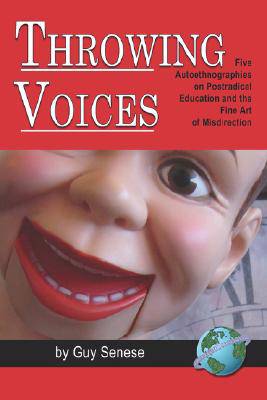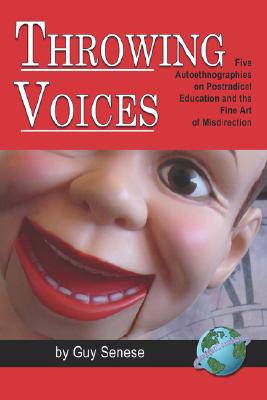
En raison d'une grêve chez bpost, votre commande pourrait être retardée. Vous avez besoin d’un livre rapidement ? Nos magasins vous accueillent à bras ouverts !
- Retrait gratuit dans votre magasin Club
- 7.000.000 titres dans notre catalogue
- Payer en toute sécurité
- Toujours un magasin près de chez vous
En raison de la grêve chez bpost, votre commande pourrait être retardée. Vous avez besoin d’un livre rapidement ? Nos magasins vous accueillent à bras ouverts !
- Retrait gratuit dans votre magasin Club
- 7.000.0000 titres dans notre catalogue
- Payer en toute sécurité
- Toujours un magasin près de chez vous
Throwing Voices
Five Autoethnographies on Postradical Education and the Fine Art of Misdirection (PB)
Guy Senese
Livre broché | Anglais
84,95 €
+ 169 points
Format
Description
This book is a search for the promises of public education and the places where these are broken by critics feeding at the academic and professional trough. This book is a venture in critical auto-ethnography, exploring critique through this ethnographic technique has allowed me to bring stories to the reader that work to illuminate the personal nature of educational ethics. It works to fill the gap in education critique where self-examination is missing. It is a cultural study of five different educational environments. Research in cultural studies attempts to account for cultural objects under conditions constrained by power and defined by contestation, conflict, and change. Cultural Studies grapples with the volatility of cultural happenings. Throwing Voices emphasizes self-reflexivity; an awareness that scholars and their scholarship are themselves caught up in the social currents and in the global circulation of meanings being studied. In taking up questions from this perspective, cultural studies both draws on and develops key strands of contemporary cultural theory: semiotics, deconstruction and poststructuralism, dialogics, subaltern and postcolonial studies . The field also draws on and develops a number of innovative methodologies: autoethnography, blurred genres of writing, and other new forms of critical research. Within, I pay homage to satirist Lenny Bruce, and it earned me a one way ticket to scholarly palookaville. I had actually, not virtually transgressed, in a conference forum where virtual radicalism trumps reality routinely. I sold cars and write and the intersection between values in education and in this pinnacle of American commerce. Here is a chronicle of time spent as evaluator in a small Native American school, with an effort to draw attention to the world of social class, yet catalogue my own complicity in the evaluation game. And here are my decisions as a state education department bureaucrat, set against the moral universe of the Chicago poetry slam. Finally, is work to find the truth in a critical race theory, and hopes for solidarity in art, in jazz and in the world of New Orleans music. All follow the breadcrumbs back through a career to find the source of compassion for working people and their children, and potential solidarity through a clearer more honest language than the language of higher education and administration.
Spécifications
Parties prenantes
- Auteur(s) :
- Editeur:
Contenu
- Nombre de pages :
- 176
- Langue:
- Anglais
Caractéristiques
- EAN:
- 9781593118273
- Date de parution :
- 12-09-07
- Format:
- Livre broché
- Format numérique:
- Trade paperback (VS)
- Dimensions :
- 156 mm x 234 mm
- Poids :
- 254 g

Les avis
Nous publions uniquement les avis qui respectent les conditions requises. Consultez nos conditions pour les avis.






